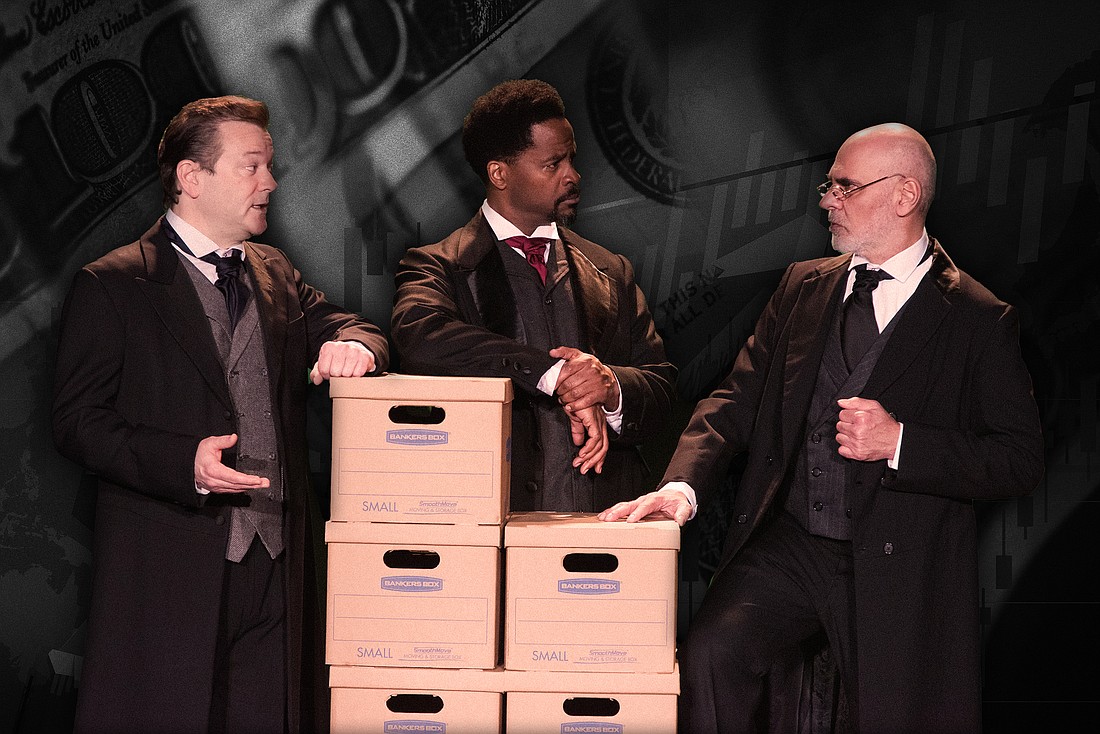- April 29, 2024
-
-
Loading

Loading

Stefano Massini’s “The Lehman Trilogy” tells a big story. Not surprisingly, it’s a big play. This heavyweight three-act contender weighs in at three hours. (Three hours and thirty minutes, if you include the intermissions.)
While I love theater, I wasn’t sure if I loved it that much. Turns out, I did. Massini is a world-class storyteller. He originally told the story in Italian. Nothing’s lost in Ben Power’s English translation. The same can’t be said for the following plot summary. But here goes …
Once upon a time, there were three Lehman brothers: Henry (Howard Kaye), Mayer (Rod Brogan) and Emanuel (Beethovan Oden). They lived in a village in Bavaria, but they weren’t happy.
The Brothers Lehman decided to come to America. In 1844, Henry got there first; Mayer and Emanuel arrived later. The brothers set up shop in Mobile, Alabama. In the early days, they sold dry goods to cotton growers. But cash-poor farmers asked if they could trade raw cotton for supplies. The brothers said yes — and quickly reinvented their business.
Their reinventions didn’t stop. The long list of new ventures includes: cotton trading, railroads, stock trading, commodities trading, coffee speculation, America’s first TV set and investment banking. Thanks to all these reinventions, the Lehman brothers (and the firm they started) made lots of money. Their bets all paid off — until they didn’t.
Back in the early 2000s, the grand old investment bank added a mortgage-backed securities division. The new kids made a lot of money disappear. In 2008, the Lehman Brothers crashed and burned. They also got blamed for the housing crisis, but that's another story.
In Massini’s play, the Lehman story unfolds against a backdrop of births and deaths and other spins of the karmic wheel. Yellow fever claims Henry. Mayer finds a wife. Life goes on until it doesn’t. But the life of business is always the main story.
But “tale” would be a better way to put it.
“The Lehman Trilogy” breaks the key rule of playwriting. “Show, don’t tell.” There’s a whole lot of telling here. The actors constantly break character to provide segues, set-ups and narrative descriptions. At times, it feels like they’re reading stage directions. At other times, it feels like a poetry reading. But it works.
Richard Hopkins directs Massini’s high-density material with high-energy verve and laser-beam focus. It doesn’t feel like a three-hour play. If Hopkins weren’t so good, it would feel longer.
The three actors hit it out of the park. Kaye’s Henry is the big brother in charge. He’s smart, adaptable and fiercely proud of what he’s created. He doesn’t know the meaning of the word quit. Despite that stubborn streak, a good argument will change his mind.
Oden's Emanuel is the middle child. He’s smart and cocky, and puts the business first — whether he likes it or not. But don’t get the wrong idea. Emanuel’s self-sacrifice is self-interest. He likes big stuff and nice things. He’s the driving force in the move to New York City. “Always more, always better” is his credo. (His logic is what changes Henry’s mind.)
Brogan’s Mayer is the soft-spoken baby brother. Cool head, warm heart. He’s typically the peacemaker between Henry and Emanuel. Thanks to his soft face, his brothers nickname him “the potato.” They ultimately discover how far they’ve underestimated him.
Along with the three Lehman brothers, the actors portray all the other characters in this play. That probably sounds like an athletic performance. It is.
Throughout this narrative, Jim Prosser is banging away on an old piano in the corner. His clever music arrangements have an old-time music hall feel. Thom Korp’s projections flood the back of the stage with slices of lost time. Liz Bourgeois’ costumes express the 19th-century bourgeoisie respectability the brothers strive to project.
Isabel and Moriah Curley-Clay’s staging is unconventional and inventive. Their minimalist set is a rotating platform with a few chairs, one long table and lots of banker’s boxes in constantly changing permutations.
Those boxes supply every prop or symbol the play requires. Most poignantly, they stand for the Lehman brothers' rise and fall. The firm’s last day frames the play. 9-15-2008: the day they cleared out the office. The space is empty, dead. No action, no trading, no life. The boxes are scattered around like cardboard coffins.
“The Lehman Trilogy” is a captivating slice of American history. It’s a Horatio Alger rags-to-riches story; an immigrants’ story; a story of constant reinvention. But it’s oddly out of step with the 21st century.
Massini is a great storyteller. His three-hour tale held my interest. But his big story left one big thing out. That sin of omission? The legacy of American slavery. It’s barely mentioned. Cotton laid the foundation of Lehman’s financial empire. That cotton didn’t pick itself, after all. One brother feels a dark shadow of guilt in a passing conversation. That’s about it.
“The Lehman Trilogy” could’ve been all about that. How American capitalism built its equity on the backs of an unpaid workforce. Am African American playwright like the late John Sims could’ve written that play. But it’d be a different play.
Ultimately, this play tells the story of what happens when the American dream comes true.
And what’s left when that dream is over.